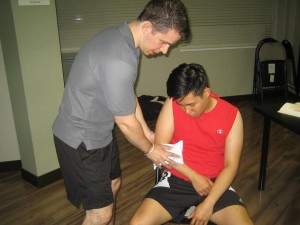Overview Of Cuts And Grazes
When a person gets a cut or graze, this is often considered a non-emergency type of injury and can definitely be treated at home. Really, the person simply needs to learn proper care in order to ensure that this cut or graze does not become worse and get infected. If the cut is severe then medical treatment might be required.
Disclaimer / More Information
The information posted on this page on external bleeding, including cuts and grazes, is for learning and educational purposes only. To learn to recognize and manage severe and minor bleeding injuries register for first aid training at one of our training centre located throughout Canada. Training centres are located in Edmonton, Calgary, Vancouver, Surrey, Kelowna, Winnipeg, Toronto, Ottawa and Halifax.
Treating a Cut or Graze at Home

Here are the steps that you are going to want to follow in order to treat this cut or graze at home:
- Stop the bleeding by putting pressure on this cut or graze with a towel or bandage until the bleeding stops. Try to elevate the area if the bleeding is more severe.
- Wash your wants to ensure that you are not putting bacteria into the cut with your hands.
- Clean the area with water. Do not use any antiseptic as this can affect how fast the wound is going to heal.
- Dry the area with a clean towel to ensure that it is dry as this helps the bandage to stick more fully.
- Once clean, apply a bandage to the area.
You can utilize pain killers if you are feeling pain, such as ibuprofen or Paracetamol.
When you Need Medical Attention
There are times in which you may need medical attention rather than treating this at home. This includes:
- If there is a rough edge to the wounds
- There is bodily fluids or other fluids that could have gotten into the would
- The wound is longer than 5 cm
- There is a foreign object in the wound
- If you find that the wound has not healed properly, or it becomes infected, then you need to seek medical attention.
- Children are more likely to need medical attention than adults
Signs of an infected cut or graze includes:
- Having a fever
- The cut or graze will be red around it
- There could be more pain in the wound area
- The area may bruise and swell
- Your glands may be swollen
Cuts and Grazes First Aid
- Wash the wound by soaking it under some water.
- Tap it dry using a gauze pad and shield it with antiseptic gauze. If you don’t have gauzes, then use a fresh, non-fluffy material.
- Elevate and sustain the part of the body that’s hurt. If it’s an arm or hand, elevate it above the head.
- Get rid of the gauze on the wound and place an antiseptic bandage.
- Visit your GP if you think you may have an infection.
Related Video On Cuts And Grazes
